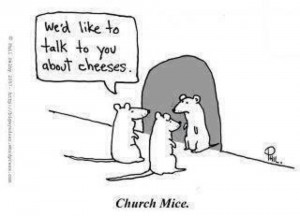 Dan Phillips, at the Pyromaniacs blog site wrote a short article entitled, “A stick, salt water, salvation — and us.”
Dan Phillips, at the Pyromaniacs blog site wrote a short article entitled, “A stick, salt water, salvation — and us.”
“God works through means,” we say.
And it’s true. In fact, He usually works through means. That is to say, God uses some portion of His creation to affect some other portion of His creation.
This is maybe better understood if we think of the one occasion in which God used no means: the creation of the universe. Unless you wish to press the thought that God used His word (Ps. 33:6), God did not create the universe by means of anything in the universe. One timeless moment; the triune God alone; the next (first!) moment, a word, and bam! — the universe.
Otherwise, He uses means. Adam must feed himself, must build a shelter. Eve must make clothes. Noah has to cut down a lot of trees. And so on.
Now, sometimes the means are plain and proportionate. Right now, I’m tapping keys, and letters are appearing on the screen. No letter appears without a tap; a tap produces a letter. Or a space. Means, simple and straightforward.
And then there’s this scene:
The Lord said to Moses, “Why do you cry to me? Tell the people of Israel to go forward. 16 Lift up your staff, and stretch out your hand over the sea and divide it, that the people of Israel may go through the sea on dry ground. 17 And I will harden the hearts of the Egyptians so that they shall go in after them, and I will get glory over Pharaoh and all his host, his chariots, and his horsemen. 18 And the Egyptians shall know that I am the Lord, when I have gotten glory over Pharaoh, his chariots, and his horsemen.”
19 Then the angel of God who was going before the host of Israel moved and went behind them, and the pillar of cloud moved from before them and stood behind them, 20 coming between the host of Egypt and the host of Israel. And there was the cloud and the darkness. And it lit up the night without one coming near the other all night.
21 Then Moses stretched out his hand over the sea, and the Lord drove the sea back by a strong east wind all night and made the sea dry land, and the waters were divided. 22 And the people of Israel went into the midst of the sea on dry ground, the waters being a wall to them on their right hand and on their left. (Exodus 14:15–22)What obvious causal relationship was there between Moses lifting his staff, and that great body of water cleaving in two? None. Zero. If he’d poked it in the sea, he’d have displaced a bit of water. But holding it out? No relationship whatever. After all, this is a walking stick. It isn’t some wand from Hogwarts.
Yet, would the waters have parted, had Moses not stretched out the staff? No.
So though there was no direct causal relationship between Action A and Action B, the former was necessary for the latter. Why? Because God ordained it to be so. Because God ordained to use the means of Moses raising his staff. When Moses did what God told him to do, God accomplished what Moses was unable to effect.
Now to the abrupt payoff.
Tell me how this relates to Romans 10:8-17, and what effect this truth should have on you and me.
Don’t let me down.
Tom Chantry commented…
The only thing that made holding out a rod over the sea effective was the fact that God had ordained it, and the only reason Moses could have thought to do it was that God told him to.
Similarly, the only reason preaching is ever effective to the saving of souls is that God ordained it to be so, and the only reason it occurs to us to preach is that God told us so.
Having little time to unpack all the implications, I’ll stick to two that jump to mind.
1. As a preacher, I should feel about as much pride of accomplishment when someone is saved as Moses should have felt when the sea parted. I had about as much to do with it as he did.
2. For a preacher / church to decide that preaching isn’t likely to work and we ought to try something else is roughly equivalent to Moses deciding to chuck rocks into the sea instead of holding out his staff.
Lots to ponder here… Selah.

 by Dane Ortlund
by Dane Ortlund It is not uncommon to hear Christians suggesting that every sin is equal in God’s sight. Perhaps you have heard someone say something such as, “sin is sin – whether you hate someone or murder someone, ‘You shall not murder; and whoever murders will be liable to judgment.’ But I say to you that everyone who is angry with his brother will be liable to judgment; whoever insults his brother will be liable to the council; and whoever says, ‘You fool!’ will be liable to the hell of fire…. “You have heard that it was said, ‘You shall not commit adultery.’ But I say to you that everyone who looks at a woman with lustful intent has already committed adultery with her in his heart. If your right eye causes you to sin, tear it out and throw it away. For it is better that you lose one of your members than that your whole body be thrown into hell. And if your right hand causes you to sin, cut it off and throw it away. For it is better that you lose one of your members than that your whole body go into hell.” – Matthew 5:21, 22, 27-30 ESV
It is not uncommon to hear Christians suggesting that every sin is equal in God’s sight. Perhaps you have heard someone say something such as, “sin is sin – whether you hate someone or murder someone, ‘You shall not murder; and whoever murders will be liable to judgment.’ But I say to you that everyone who is angry with his brother will be liable to judgment; whoever insults his brother will be liable to the council; and whoever says, ‘You fool!’ will be liable to the hell of fire…. “You have heard that it was said, ‘You shall not commit adultery.’ But I say to you that everyone who looks at a woman with lustful intent has already committed adultery with her in his heart. If your right eye causes you to sin, tear it out and throw it away. For it is better that you lose one of your members than that your whole body be thrown into hell. And if your right hand causes you to sin, cut it off and throw it away. For it is better that you lose one of your members than that your whole body go into hell.” – Matthew 5:21, 22, 27-30 ESV